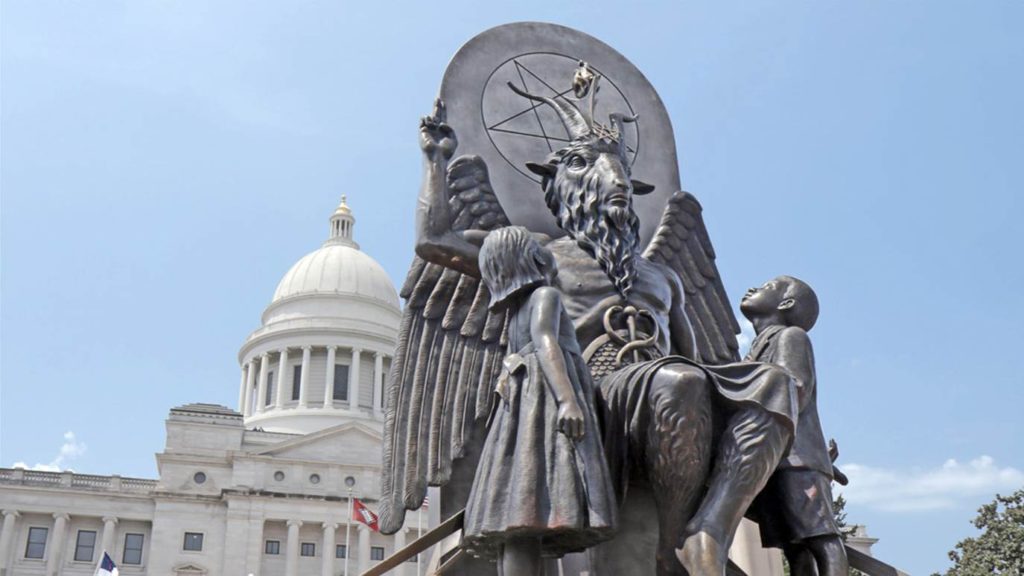Penny Lane has previously directed feature documentaries “The Pain of Others,” “Our Nixon,” and “Nuts!” Her work has screened at International Film Festival Rotterdam, Sheffield, Sundance, and SXSW, among other festivals. She has been awarded grants from Sundance, Creative Capital, Cinereach, TFI Documentary Fund, Jerome Foundation, Catapult Film Fund, LEF Foundation, New York State Council on the Arts, and many more organizations. And, yes, Penny Lane is her real name.
“Hail Satan?” will premiere at the 2019 Sundance Film Festival on January 25.
W&H: Describe the film for us in your own words.
PL: “Hail Satan?” is a documentary about the birth and rapid rise of The Satanic Temple, the most consequential and misunderstood new religious movement in America. These new Satanists have concocted a wicked blend of trolling media pranks, surprisingly sincere non-theist yet deeply religious beliefs, and a proven legal strategy for fighting back against the erosion of the wall between church and state.
W&H: What drew you to this story?
PL: I’ve always felt like a bit of a black sheep myself, on the outside looking in, the skeptic/naysayer in every group I’ve ever accidentally become a part of. I’ve never believed in God or been part of a religion or understood the appeal or purpose of those kinds of things.
In other words, I feel a pretty strong emotional and intellectual kinship with the type of person who would declare one’s self a Satanist: the social isolation, the intellectual fun, the undeniable sense of purpose that comes with embracing the critical role of the heretic in society.
I felt I immediately understood the Satanists as individuals, but I wanted to understand how a religion for the non-religious, secular, skeptical individualists of the world could possibly work.
W&H: What do you want people to think about when they are leaving the theater?
PL: There are a lot of intellectual and emotional surprises in the film which I expect viewers to be thinking of long after they leave the theater. The skeptical atheists will be forced to rethink their knee-jerk negative response to religion and religious people, just as the more religiously inclined or culturally conservative viewers will be forced to rethink their own assumptions about Satanists and Satanism.
I suspect the film will lead to much discussion over what constitutes a legitimate religion, and how religion can and should continue to function in an increasingly secular world.
Finally, I expect many people will want to know if there is a chapter of The Satanic Temple in their own community!
W&H: What was the biggest challenge in making the film?
PL: Despite the fact that I have been making nonfiction-ish films for over a decade, this is actually the first film in which I (1) followed a story as it unfolded over time by (2) documenting with a camera (3) unscripted real-world events (4) involving living subjects with whom I had to (5) establish trust and (6) negotiate access.
So, basically, all the things that constitute Documentary 101 for normal and sane documentarians comprised a brand-new set of interesting and difficult challenges for me.
W&H: How did you get your film funded? Share some insights into how you got the film made.
PL: Producer Gabriel Sedgwick brought the idea of “Hail Satan?” to me and we developed it independently for about 18 months. This development period was supported by grants from the Catapult Film Fund, the Sundance Institute, Rooftop Films, Cinereach, and my employer, Colgate University. Also during this time I was receiving a ton of direct support from Chicken & Egg as one of their Breakthrough Award winners. We used those funds and that time to cut a pretty hefty sample — much longer than what people tell you make for a sample. Then Magnolia Pictures acquired worldwide rights to the film, and in so doing made possible the completion of the film.
We have been extremely lucky and grateful for the support of each of these institutions.
W&H: What inspired you to become a filmmaker?
PL: I have no idea. It all happened backwards and slant. I’m not even that wild about movies; I am nobody’s idea of a cinephile and I much prefer books. I wandered into filmmaking, and I honestly love almost every single thing about it — and it seems I’m quite good at it, so onward!
W&H: What’s the best and worst advice you’ve received?
PL: Good advice is that external praise and notice will come and go like the crashing of waves, and you have to learn to stand there on your own two feet whether high tide or low. This metaphor falls apart in the utter capriciousness of the external praise and notice, as opposed to the clockwork regularity of the tides.
Bad advice is to “follow your passion” and expect the world will then owe you a living. Every year in my capacity as a college professor I see hundreds of young people freaking out trying to figure out what their “passion” is when they have no idea. Instead, a good and sane idea is to try out different careers to see where you can be most useful in the world, what kinds of jobs make you happy or unhappy, find a good fit between your abilities and personality and what most needs doing in the world, and do that.
W&H: What advice do you have for other female directors?
PL: If you’re not terrified, you’re probably not doing it right.
W&H: Name your favorite woman-directed film and why.
PL: Oh, there are so many! I don’t have, like, a separate mental list for woman-directed films, but let’s go with “The Love Witch” by Anna Biller. It is perfection in every way: sui generis, fully-realized, genius-level artistry.
W&H: It’s been a little over a year since the reckoning in Hollywood and the global film industry began. What differences have you noticed since the #MeToo and #TimesUp movements launched?
PL: I have not noticed any differences.







